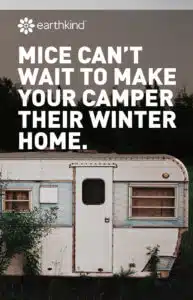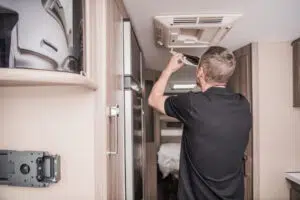Getting Your Camper or RV Prepared for Winter
By : Rita Stadler
Many camper or recreational vehicle (RV) owners store away their vehicles during the winter months. If you aren’t planning on using it during this time, then winterizing your RV before the cold weather sets in is essential to protect it from the elements and prevent any damage.
By taking a few simple steps, you can ensure that once you get your RV out of winter storage, it will be ready to hit the road again when the warmer weather arrives.
Why It’s Important
Winterization is a crucial process that can help to prevent costly repairs and extend the life of your camper. Some of the key steps include draining the water systems, removing all perishable food, and disconnecting the battery. Completing these items can help make sure nothing breaks or rusts during storage, and can also prevent pests from entering and causing damage.
Taking the time to do this now can save you a lot of headaches later on. The process helps to ensure that your camper or RV stays in good condition in the freezing temperatures and is ready for the camping season when it arrives.
10 Camper & RV Winterization Tips
Once you pack up your camping gear for winter, follow this checklist full of winterization tips:
- Closely inspect everything, inside and out. This includes everything from your doors to your washing machine to your water heater and everything else in between. If any repairs are needed, even small ones, make them now so the problem doesn’t get worse while the vehicle sits in storage.
- Fill up the gas tank and add a fuel stabilizer. Check all other fluid levels in the engine and top off everything to prevent fluids from freezing or drying out.
- Move everything out. Don’t leave any food or beverages packed away, even if they are unopened. Canned or bottled items can freeze and expand in cold weather and might burst, leaving a huge mess waiting for you, or worse yet a serious rodent infestation.
- Give everything a deep clean. Dirt and stains will only be harder to remove if you let them set all winter long. Be sure to get rid of any crumbs and sticky spills that can also attract bugs and lead to a pest infestation!
- Drain all water from holding tanks and dry all water lines. Any remaining water in pipes, tanks, or lines could stagnate or freeze, damaging your plumbing system. Inspect everything including your toilet, ice maker, and each faucet to make sure all water is drained.
- Add a non-toxic RV antifreeze. Make sure to pour antifreeze that is RV-approved down all of the drains and into the toilet bowl, too.
- Make sure all appliances are turned off and unplugged. Leave the fridge, freezer, and dishwasher doors propped open to prevent mold and musty smells. Clean them out thoroughly to get rid of any leftover food crumbs or spills.
- Cover all vents, patch any cracks or holes, and make sure the exhaust pipe has a mesh cover. There’s not much worse for RVers than finding out you have a pest infestation. Rodents, insects, and even birds can squeeze through very small openings and sneak inside of your vehicle if you give them an opening. This can lead to larger pest problems and damage to your vehicle.
- Clean the exterior thoroughly. You should give the exterior of your camper a thorough cleaning to remove any dirt and debris. Dirt and debris could cause problems later on such as rusting, paint peeling, and more.
- Put your RV up on blocks to take the weight off the tires.
Winterization is a necessary step in camper and RV maintenance. It might sound like a lot of work, but following this checklist will make the job a whole lot easier. There are likely further recommendations for storing your vehicle in the owner’s manual that you should also read and follow.
Before the vehicle goes into storage, be sure to throw in a couple of pouches of EarthKind®’s botanical rodent repellent, Fresh Cab®, to help prevent any unwanted rodents from making your vehicle their home. Spend more time planning your next road trip and less time keeping mice away!









 day
day